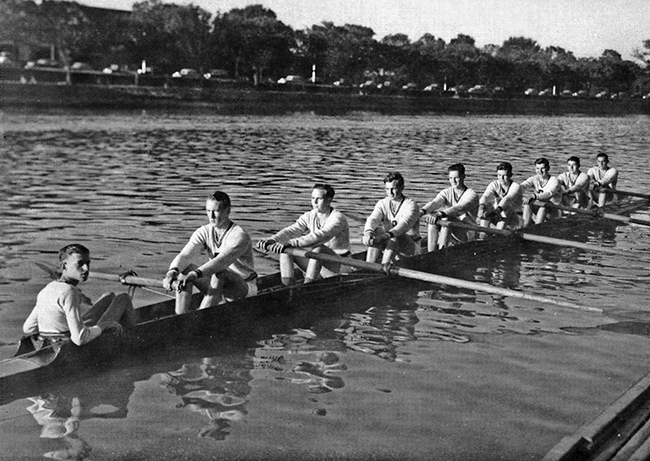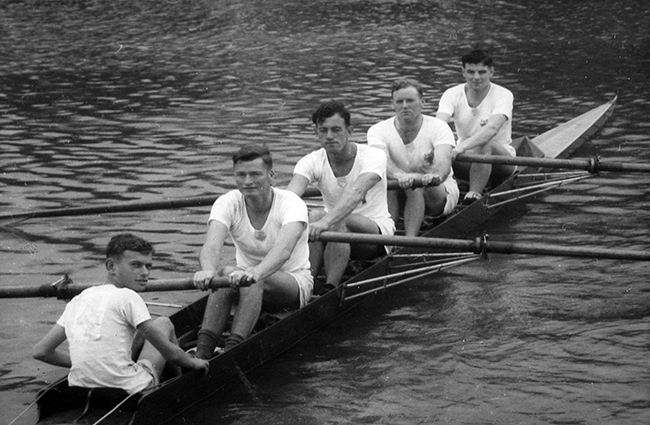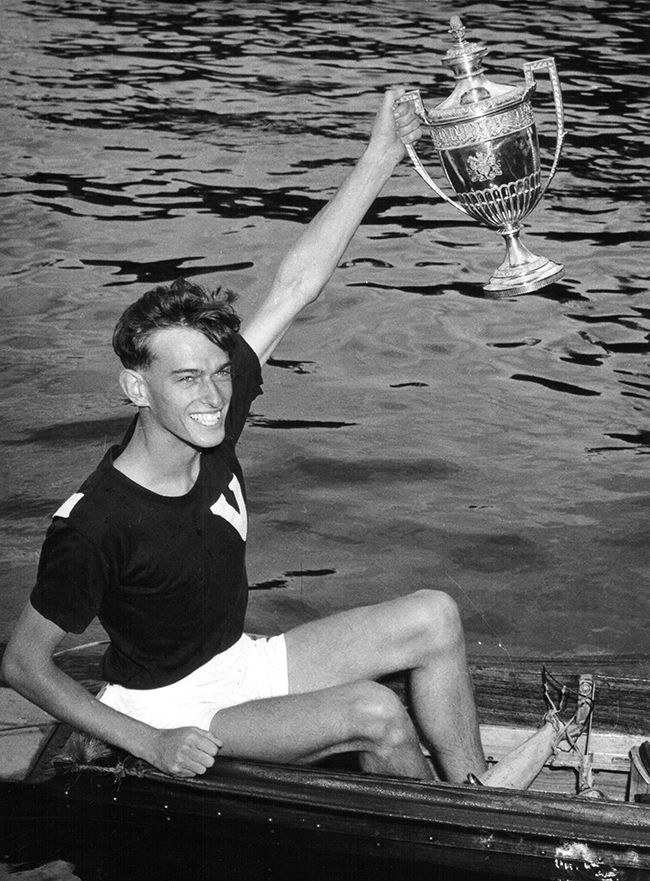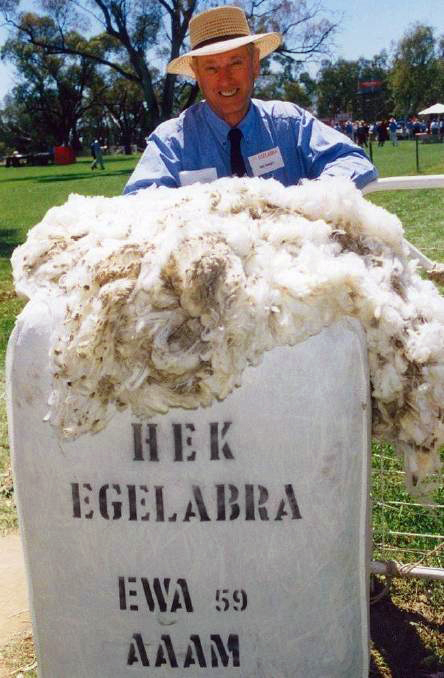William M Bailey
Mercantile Rowing Club (VIC)
12 May 1935 - 7 August 2020
Bill was born in Melbourne, the only child of Bertha and Max Bailey, Bill continued the tradition of his father Max by also being a Scotch College and Mercantile coxswain. The Bailey name is perpetuated at the Club in the trophy presented annually to the champion coxswain.
Bill was to become a renown cox himself steering Scotch College, Mercantile and Victorian King's Cup crews.
Bill spent most of the war years at Nagambie before going to Scotch College.
He started his coxing whilst a student at Scotch College. He coxed the first crew not once, but three times in 1948, 1949 and 1950. Sadly for him, Scotch was not successful in any of those three years. Paul Mishura, the Scotch College Archivist, noted the interesting fact that Max did the opposite of his son Bill by coxing three winning Head of the River crews in 1925-27.

Bill in the coxswain seat of 1950 Scotch College crew
Bill started coxing at Mercantile from 1947 whilst he was still at school and so was well known and coxswain skills well developed by the time he left school. He was immediately used in senior coxswain duties.
1947-48 season
- Coxed maiden crews and sadly none were successful.
- Won a prized Morell Cup in the Morell Eights on 28th November 1947.
- Awarded the Club's most improved coxswain award.
- Coxed the Scotch College first crew - fourth
1948-49 season
- Won his first Victorian Championship in the pair which he coxed 27th December 1948. He also coxed other crews in Championship races but they were unsuccessful.
- Won a winning maiden eight during the season. He also steered several junior crews and a maiden eight which race in Sydney at the inaugural Metropolitan regatta.
- Won the Harlequin Time Trial
- Coxed the Scotch College first crew - fourth
1949-50 season
- Senior cox at Mercantile consistently winning several senior events throughout the season
- Won Victorian Champion Four and coxed the Club's unsuccessful senior eight
- Coxed the Scotch College first crew - second

Bill coxing the 1950 Victorian Champion four
1950-51 season
- This was Bill first season out of school and he was now not only the Club's senior coxswain, but also Victoria's top coxswain.
- Won Victorian Championship eight
- King's Cup coxswain - Second
- Won all but one senior eight race of this season and naturally won the coxswain's trophy for most wins.
- Won the Harlequin Time Trial
- Won several senior four and pair races and the senior premiership by a large margin.
1951-52 season
- Again Bill was the Club's and Victoria's senior coxswain.
- Coxed the winning Victorian King's Cup crew defeating the nominated Australian Olympic eight.
- Won Victorian Champion eight and pair
- Won numerous senior events and the Sprigg time trial.
- Won the Harlequin Time Trial
- For the first time the Max Bailey trophy was presented for the champion cox and it was presented to his son, Bill.
1952-53 season
- Again Bill was the Club's and Victoria's senior coxswain.
- Again coxed the winning Victorian King's Cup crew
- Won Victorian Champion eight and four
- Won all senior eight races of the season.

Bill celebrating after the 1953 King's Cup win
Bill retired at the end of this season after an outstanding coxing career. It was hoped that he might row after retiring from coxing but that was not to be as he pursued a career in rural industry. Bill did, however, maintain an interest in rowing – primarily through a lifelong friendship with Bob Aitken, who had shared many of Bill’s victories as the Mercantile and Victorian stroke.
The following description of his career after rowing appeared in "The Land" on 18th August 2020.
Bill then made the decision to pursue his desire to work with animals and spent a few months working for the Shippen family at Banyandah, Moulamein, before starting a jackarooing position at Woorilla, Hillston, with the McLean family. Here he gained experience in general sheep and property management.
During 1955 and 1956, Bill worked for the Pye family at Gingie, Walgett. He arrived at Gingie shortly after it was cut up for closer settlement and, while there, experienced the floods of the 1950s in the Walgett district.
There was also a long shearing strike which coincided with an extreme fly wave. Bill and other jackeroos in the district were organised into teams to shear the Gingie and surrounding properties' sheep.
From 1956 to 1957, Bill was a jackaroo and in charge at Gnomery at Burren Junction owned by the Saddington family.
In 1958 he went to Haddon Rig Merino stud, Warren, as a senior jackaroo, and was later promoted to stud master in charge of the special stud breeding and the shedded rams, accompanying many sale teams to Perth and Sydney.
It was during his years at Haddon Rig that Bill also met Dick Jago who would become a close lifelong friend and fellow sheep classer.
In 1961, Bill started a position as overseer at Egelabra Merino stud, Warren. This was to be the beginning of a long and successful partnership with the Kater family.
In 1962, he married Joan and was promoted to manager of Eenaweena, the Egelabra ram depot. His time at Eenaweena shaped his sheep classing pathway, working with the special stud ewes, doing the odd classing trip, and selecting rams for clients with Reg Cobb and Harry O'Brien (eventually inheriting both their runs).
At the end of 1969, Bill resigned his position at Eenaweena and moved the family to Dubbo where he started his long and rewarding full time classing career, taking him to four states around Australia, and a world Merino conference in South Africa.
Bill and Joan later bought Chelsea at Dubbo, which they ran on a part-time basis, and established a small Egelabra based breeding flock of their own.
In 1976 when Egelabra was searching for a general manager, Bill recommended Hugh Lydiard, forming a formidable team for 21 years. They complemented each other, not only improving the Egelabra sheep, but educating many young people along the way some of whom went onto very high profile jobs, many still in the industry today.
Upon Hugh's retirement, Bill also worked closely with Cam Munro in continuing to build the stud's enviable reputation.
There were many highlights in Bill's successful career, including:
- The 1988 Melbourne Ram Sale where a team of four Egelabra rams averaged $25,000
- In 1989 Bill's client, Gunyah Merino stud at Cooma, purchased a ram for $30,000
- The impact he had in the Surat district in Queensland, where he built a large client base, which led to the formation of the Egelabra Wool Growers Association.
Bill classed millions of sheep between 1970 and his retirement in 2000, with 1989 being close to his record year classing in excess of 200,000 young ewes.
Bill was unique with understanding and identifying a certain type of sheep to suit different environments along with the breeding direction of every client.
He adapted to every personality and was not just a sheep classer; he was a mentor, counsellor and friend to many.
Upon retiring from sheep classing, Bill handed the reins to Paul Kelly, Egelabra's current sheep classer.
In 2004, Bill and Joan also sold Chelsea, with their final mob of Egelabra-blood wethers topping the Narromine breeders' sale.
Bill died in Dubbo on August 7, 2020.
He is survived by his wife, Joan; daughters and sons-in-law Wendy and Lynda, Hunter and Donald; and grandchildren, Lachlan, Sarah, Campbell, Simon and Edwina.

Bill on his retirement from sheep classing in 2000 at Egelabra, Warren, NSW
Sources:
- Mercantile Rowing Club annual reports
- Celebration of life order of service
- Mercantile - A Century of Rowing, published by Mercantile Rowing Club 1980 written by by R R Aitken and others
- The Land, 18th August 2020
- Paul Mishura email 14 Nov 2020
Andrew Guerin
Nov 2020

